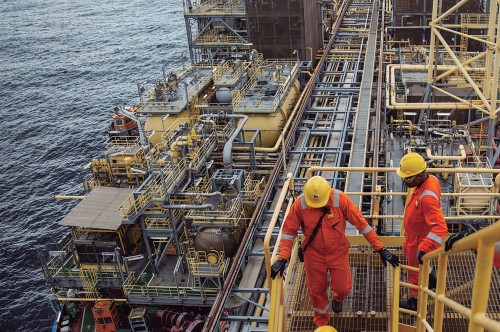Nigeria has enormous potential to diversify the economy away from crude oil, which has overshadowed the gas in Nigeria’s oil and gas industry. The country is struggling to exploit its natural gas resources which rank among the 10 largest worldwide.” Gbite Falade, managing director and chief operating officer, Oilserv

 Image courtesy of Eni
Image courtesy of Eni
The Minister of State for Petroleum Resources H.E. Chief Timipre Sylva declared 2020 as ‘the year of gas for the nation,’ an announcement that set the theme for the year and chronologically coincided with the FID on the Train 7 project by the NLNG (Nigeria Liquefied Natural Gas Ltd). “Nigeria has enormous potential to diversify the economy away from crude oil, which has overshadowed the gas in Nigeria’s oil and gas industry. The country is struggling to exploit its natural gas resources which rank among the 10 largest worldwide,” stated Gbite Falade, managing director and chief operating officer of Oilserv, a leading Nigerian EPC company.
According to the DPR, in April of 2019, of the 1.2 billion cf/d of gas produced locally, approximately 41% was exported, only 48% used domestically, meanwhile the remaining was flared. Underlining the move towards gas is the Nigerian Gas Flare Commercialisation Program (NGFCP), which aims to provide oil and gas companies an alternative to gas flaring, which continues increasing notwithstanding the nation’s target to eliminate flaring by 2020, which is currently being adjusted. “About US$3.5 billion worth of inward investment is required to achieve the NGFCP target by 2020,” said Sylva.
The program aims to reduce waste as well as promote the monetization of natural gas. Between September 2018 and September 2019, more than 276.04 billion cf of natural gas was flared, which exceeded 275.31 billion cf, which is the volume of gas supplied to local power generation, which remains intermittent despite successive governments’ focus on deepening domestic gas penetration. Flared gas in Nigeria is enough to generate 2.5 gigawatts (Gw) of power, which would rid the country from its reliance on diesel generators. In 2018, the government increased the fine for flaring to US$2 per 1,000 cf. Nonetheless, the opportunity cost companies bear for the penalty of flaring remains low, therefore financial incentive is lacking to utilise the gas as opposed to flare it.“One of the challenges with gas in Nigeria is the lack of infrastructure. The government is addressing this issue and gas is being channelled for power and other derivatives,” explained Professor Anthony Adegbulugbe, chairman of Green Energy International, operators of the OML30 block. “The second is the issue of pricing. Gas has not been priced very well for the past few years. There has also been a problem with tariff collection and companies are forced to sell power to the national grid. I believe that we are now at a stage where these issues are being addressed.”
The lack of investment in power and gas distribution infrastructures hampers gas distribution to householders and industrial plants more than flaring. The government recognises this infrastructural deficit and is therefore responding with projects to stimulate Nigeria’s gas economy summarised in the table: highlighting Nigeria’s most critical gas projects.
 Image courtesy of Eni
Image courtesy of Eni
The Minister of State for Petroleum Resources H.E. Chief Timipre Sylva declared 2020 as ‘the year of gas for the nation,’ an announcement that set the theme for the year and chronologically coincided with the FID on the Train 7 project by the NLNG (Nigeria Liquefied Natural Gas Ltd). “Nigeria has enormous potential to diversify the economy away from crude oil, which has overshadowed the gas in Nigeria’s oil and gas industry. The country is struggling to exploit its natural gas resources which rank among the 10 largest worldwide,” stated Gbite Falade, managing director and chief operating officer of Oilserv, a leading Nigerian EPC company.
According to the DPR, in April of 2019, of the 1.2 billion cf/d of gas produced locally, approximately 41% was exported, only 48% used domestically, meanwhile the remaining was flared. Underlining the move towards gas is the Nigerian Gas Flare Commercialisation Program (NGFCP), which aims to provide oil and gas companies an alternative to gas flaring, which continues increasing notwithstanding the nation’s target to eliminate flaring by 2020, which is currently being adjusted. “About US$3.5 billion worth of inward investment is required to achieve the NGFCP target by 2020,” said Sylva.
The program aims to reduce waste as well as promote the monetization of natural gas. Between September 2018 and September 2019, more than 276.04 billion cf of natural gas was flared, which exceeded 275.31 billion cf, which is the volume of gas supplied to local power generation, which remains intermittent despite successive governments’ focus on deepening domestic gas penetration. Flared gas in Nigeria is enough to generate 2.5 gigawatts (Gw) of power, which would rid the country from its reliance on diesel generators. In 2018, the government increased the fine for flaring to US$2 per 1,000 cf. Nonetheless, the opportunity cost companies bear for the penalty of flaring remains low, therefore financial incentive is lacking to utilise the gas as opposed to flare it.“One of the challenges with gas in Nigeria is the lack of infrastructure. The government is addressing this issue and gas is being channelled for power and other derivatives,” explained Professor Anthony Adegbulugbe, chairman of Green Energy International, operators of the OML30 block. “The second is the issue of pricing. Gas has not been priced very well for the past few years. There has also been a problem with tariff collection and companies are forced to sell power to the national grid. I believe that we are now at a stage where these issues are being addressed.”
The lack of investment in power and gas distribution infrastructures hampers gas distribution to householders and industrial plants more than flaring. The government recognises this infrastructural deficit and is therefore responding with projects to stimulate Nigeria’s gas economy summarised in the table: highlighting Nigeria’s most critical gas projects.